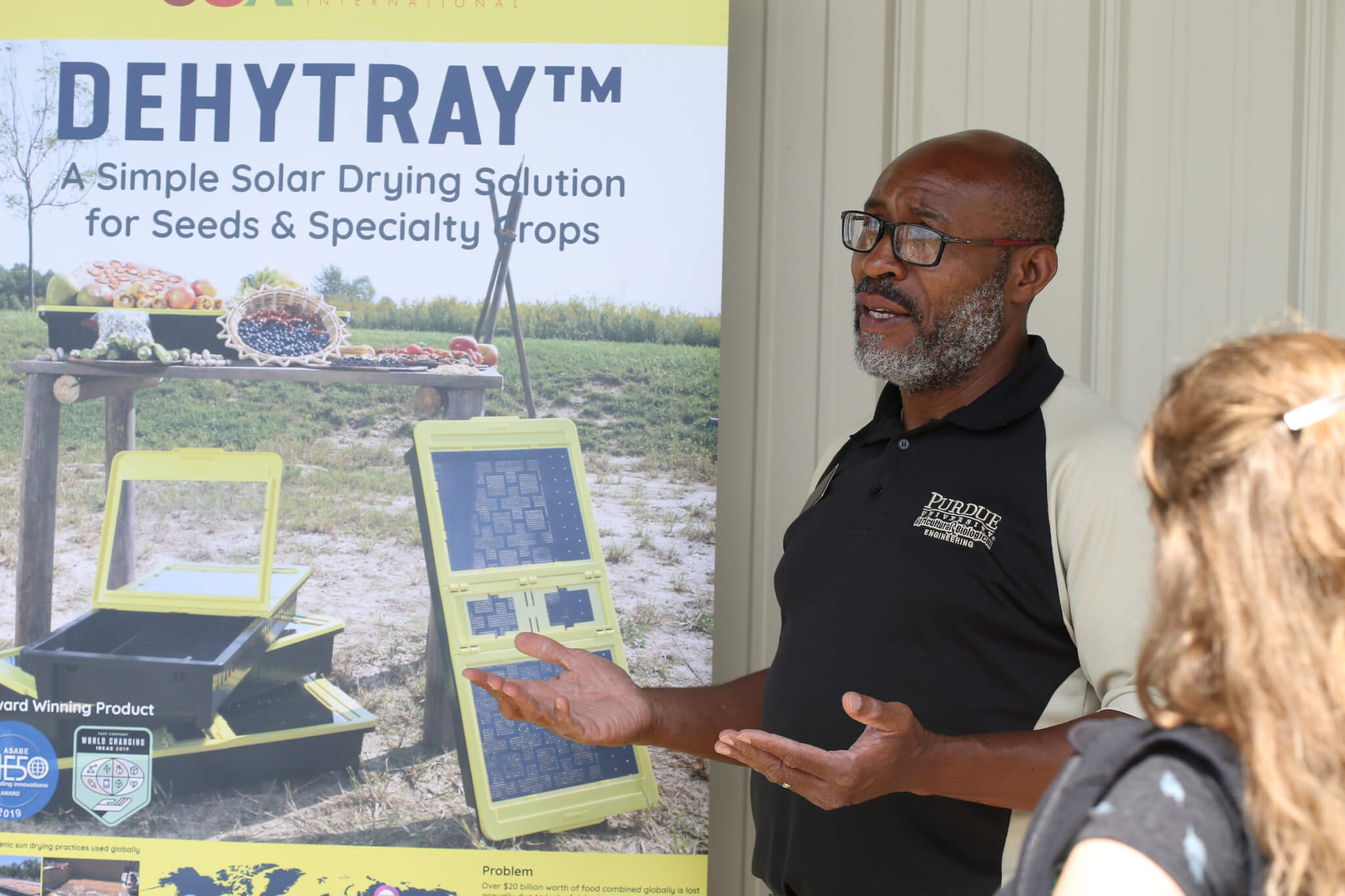Agricultural entrepreneurship: from labs to markets
Then:
Purdue University research, often published in scientific journals, became analytical ore that grateful industries mined and refined, profitably.
“We stood back as professors and watched. ‘Ooh, that’s great – they used our stuff!’” says Christian Butzke, a professor and associate head of the Department of Food Science. “A few decades later you think, ‘They took what we developed – and there’s nothing coming back to us other than a pat on the back and a handshake?’”
Now:
Commercialization is a priority in colleges and departments across a campus that is fifth in U.S News & World Report’s ranking of most innovative universities. And at the College of Agriculture, anyone with an idea for a startup company has no problem finding an audience.
“As an institution, we want to have impact,” says Bernard Engel, associate dean and director of agricultural research and graduate education. “Traditionally, our way of having impact was to wait for companies to pick up on some of our research, or through Extension. Startups are just one more vehicle – one that is often much faster. It’s not a changing goal, just a different vehicle to achieve the goal.”

Engel calls 2013 a turning point. “We were sort of bumping along prior to that,” he says. “Commercialization wasn’t such a big focus.” But discoveries from the newly opened Institute for Plant Sciences helped clarify possibilities, with the university providing strong, consistent support. The latest example is a new campus-wide program, coordinated by the Burton D. Morgan Center for Entrepreneurship, to connect innovators with novel paths to commercialization. To kick off that program, in January the College of Agriculture appointed Butzke as its first innovation and entrepreneurship (I&E) fellow.
An enology professor and co-founder of VinSense, a 2015 startup, Butzke wants to upgrade a “somewhat sporadic” approach. Eleven faculty members will be ambassadors to the 11 College of Agriculture departments, acting as mentors and motivators to professors who want to explore commercialization. College-to-college liaisons will also be appointed.
Butzke learned firsthand the benefits of collaboration with other disciplines. One of his VinSense co-founders is David Ebert, a former Purdue professor of electrical and computer engineering. “Purdue is so large. Even within a college it’s hard to know all of your colleagues,” Butzke says. Not every introduction fostered by ambassadors and liaisons will lead to a breakthrough, of course. However, Butzke says, “New combinations, even outside of our college, create the best startups.” At the Morgan Center, to explore applications for intellectual property in fields beyond their original intent, director Matthew Lynall is developing platform technology workshops.
Already on the job are business relationship managers (BRMs) – staff members who help navigate and connect professors to the Purdue technological ecosystem and explore their interests and I&E potential.
“BRM continues to listen and identify I&E opportunities throughout faculty members’ careers at Purdue, and we are eager to connect,” says Leanne McGiveron, director of business relationship managers for Agriculture Information Technology (AgIT).
“Our directive is to bring Purdue’s technical investment directly to faculty. The program is wider than I&E, but we have a unique opportunity to listen and identify I&E possibilities. As digital ag innovation is increasingly front and center for faculty, there is an evolving interest in I&E and a lot of opportunities to innovate, pioneer and make an impact in the agriculture industry.”
Brandon Reese, another business relationship manager, sends follow-up messages soon after the initial meeting. “I often get replies months later with additional questions or consult requests,” he says.
Such delays don’t surprise Butzke. “Professors have a gazillion things on their plate,” the I&E fellow says. Maybe they take the leap now, maybe later, maybe never. If they choose to try, Butzke says, entrepreneurs should know that Purdue is behind them – and in it for the long haul.
“They say 90 percent of startup companies fail if they don’t have the support system to sustain them,” Butzke says. “That’s where Purdue comes in. The consistency that Purdue can provide, with its resources, to see a project through all the way, to help them find that bit of extra time to run their own company, create a startup – that needs to flow very smoothly, because otherwise people will say, ‘I can’t take on one more thing.’”
About eight years ago, Klein Ileleji, a professor of agricultural and biological engineering, began to realize the depth of Purdue’s capabilities.
“Purdue has many resources that faculty can tap into,” Ileleji says. “And one resource led me to the next. It depends on where you start on the spectrum of entrepreneurship. I started out in the position of, ‘Is this something I want to do? And if it is, what would it look like?’”
The Morgan Center’s Entrepreneurial Leadership Academy helps faculty answer such questions. The sessions steered Ileleji to “the go/no-go position point of my career as a faculty entrepreneur. A decision point.”

Launch Box (now called Firestarter), a six-week, cohort-based program, confirmed his intentions. Grants through seed funding followed. His company, JUA Technologies International LLC, was incorporated in 2016. Its chief product, Dehymeleon, a multipurpose solar dehydrator/power generator, is still under development. An offshoot, the Dehytray, became available in 2018 and has been shipped to four continents. Both products are trademarked.
“One thing led to another,” Ileleji says. “I didn’t know it would come to this.”
For entrepreneurs, Purdue’s global reputation is priceless, Ileleji says. After advancing through Purdue’s processes, Butzke says, risk-takers have earned the right to think: “‘We’re automatically vetted. We’re not a random startup. We’re coming out of the gigantic incubator that is Purdue. That gives us a head start.’”
Ileleji appreciates the resources that Purdue provides to entrepreneurs. “Purdue doesn’t just value learning. The game-changer is that the administration values entrepreneurs and will reward them as part of the tenure process.”
Purdue’s tenure guidelines mention commercialization. “We’re one of the few universities that does,” Engel says. “We need to revisit that and dust off some college-specific language to make sure we are acknowledging the value and make sure that people are adding documentation in their tenure promotion materials.”
Assistant professors “are not waiting to be tenured to start a company,” Ileleji says. Purdue’s encouragement “allows them to be a little bit risky.”
Entrepreneurship will always be risky. Industries seek ways to “de-risk” investments, Engel says. Years ago, scouring academic reports paid dividends. Now, with Purdue finding ways to absorb significant risk on behalf of its faculty, more startups can prosper. Some will be bought by larger companies. “We are accelerating the process of adoption,” Engel says. “Many of us would argue that the modern land-grant system ought to be doing more of this to have the impact that we’re lucky to have – to serve the people of the state and beyond.”
For more:
- Office of Technology Commercialization; Purdue Foundry; Burton D. Morgan Center for Entrepreneurship; Purdue Research Foundation; Purdue Research Park
- JUA Technologies International
- AgriNovus Indiana
- Ag-Celerator
- Elevate Ventures
- Convergence Center
- I-Corps at Purdue
- John Martinson Entrepreneurial Center
The stakes are higher than whether good ideas flourish, Butzke says.
“The economic success of people and companies using the research and information that comes out of Purdue is really crucial for the sustained relevance of the academic system in our society,” he says. And a constant stream of “graduate students who are excited and have a lot of intellectual capacity to develop new things” gives Purdue an enviable advantage.
"A modern public university with a visionary strategic plan and groundbreaking initiatives will always be a tremendous innovation engine that brings out new ideas and takes them all the way to economic and societal impact."





